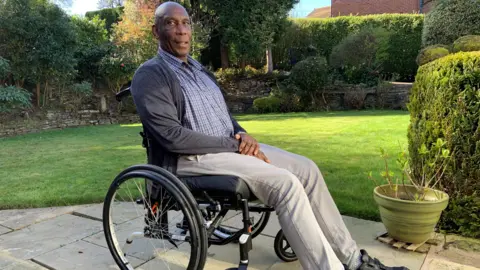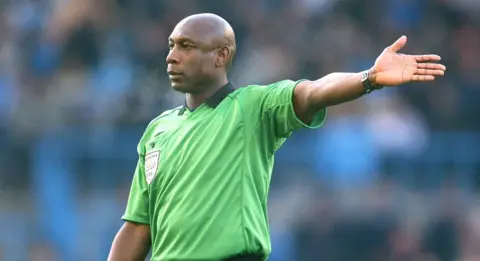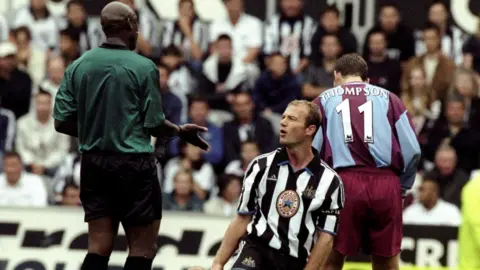BBC News, Yorkshire
 BBC
BBCUriah Rennie became a familiar face for millions of football fans after becoming the first black referee of the Premier League.
Once described as the “most suitable” party officer in global football and a martial arts expert, he is now learning to walk again after a rare condition left him paralyzed from the waist down.
After spending five months at the hospital, the 65 -year -old has spoken with BBC News about rehabilitation, his fighting spirit and a new role.
Rennie, who officiated more than 300 first -level games between 1997 and 2008, was on a birthday trip to Türkiye last year when he was beaten with a sudden back pain on the back.
“I thought I had just sleeping fun in a sun lounge, I hoped to go for the paragliding, but due to my back pain I could not go,” he says.
“At the end of the holidays I couldn’t sleep a wink of pain, and when I got home I could barely walk.”
 Richard Sellers/Sportsphoto/Allstar/Getty
Richard Sellers/Sportsphoto/Allstar/GettyRennie made history in 1997 when he officiated a match between Derby and Wimbledon County, becoming the first black referee of the superior division.
High in stature and an expert in Kick-Boxing and Aikido, protesting the players quickly discovered that he was more comfortable to stand firm during the arguments.
Magistrate in Sheffield since 1996, has campaigned for issues such as improving equality and inclusion in sport, supporting mental health and addressing deprivation.
Rennie was about to start a new role as Chancellor of the Sheffield Hallam University when he was admitted to the Northern General Hospital in October.
“I spent a month on your back and another four months sitting on bed,” he says.
“They kept me in the hospital until February, they found a nodule pushing my column and it was a rare neurological condition, so it is not something they can operate.
“I’ve had to learn to move again, I’m enriching my legs.”
 Stu Forster/Allsport/Getty
Stu Forster/Allsport/Getty“It was strange: I ran through the city essentially to be in a traction for so long.
“I had no previous back problem, but suddenly I couldn’t move and I was in a spinal unit.”
Discussing his current movement, he says: “I can move my feet and I can stop with a frame attached to my wheelchair, but I need to work on my buttocks.”
In a joke, it shows the scratches in the wheelchairs in the shale boards around his house, with physiotherapy currently occupying much of his day.
“I move in my chair doing my exercises, I am a very good and satisfied patient,” he laughs.
“He has been frustrating, but family and friends have been invaluable, the hospital was absolutely excellent and the university has been exceptional.”
He officially begins as a university chancellor in May, a position in which he has been decided to assume despite his recent experiences.
“I emphasized that I wanted to make a difference in Sheffield and the communities here,” he says.
“I continued working with community sports teams while I was in the hospital, directing them from my bed.”
He studied for an MBA at the University during his arbitration career and received an honorary doctorate in 2023 for his work with sports and local communities.
“I try to be the best thing I can physically,” he says.
“No one has told me that I will not walk again, but even if someone said I want to say that I did everything I could to try.”
Rennie, who moved from Jamaica to the United Kingdom as a child and grew in the city’s Wybourn area, says that being the first black referee was about “creating a legacy to allow other people to stop on the shoulders.”
Discussing his last challenge, he says that the compression of the spinal cord has given him a new perspective of life.
“Many people are in wheelchairs, but don’t define them,” he says.
“It has made me resistant and forceful and I will never give up, I’m not alone, there is a town that helps me.”
He concludes: “I recognize how fragile things are now.
“I don’t know if I’m going to walk completely, but I know what I must do to try and you should never lose hope.”


